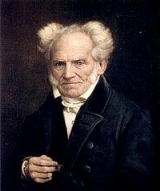
Arthur Schopenhauer
Overview
Arthur Schopenhauer was a German
philosopher known for his pessimism
and philosophical clarity. At age 25, he published his doctoral dissertation, On the Fourfold Root of the Principle of Sufficient Reason
, which examined the four separate manifestations of reason in the phenomenal world.
Schopenhauer's most influential work, The World as Will and Representation
, claimed that the world is fundamentally what humans recognize in themselves as their will
. His analysis of will led him to the conclusion that emotional, physical, and sexual desires can never be fulfilled.
Germany
Germany , officially the Federal Republic of Germany , is a federal parliamentary republic in Europe. The country consists of 16 states while the capital and largest city is Berlin. Germany covers an area of 357,021 km2 and has a largely temperate seasonal climate...
philosopher known for his pessimism
Pessimism
Pessimism, from the Latin word pessimus , is a state of mind in which one perceives life negatively. Value judgments may vary dramatically between individuals, even when judgments of fact are undisputed. The most common example of this phenomenon is the "Is the glass half empty or half full?"...
and philosophical clarity. At age 25, he published his doctoral dissertation, On the Fourfold Root of the Principle of Sufficient Reason
On the Fourfold Root of the Principle of Sufficient Reason
On the Fourfold Root of the Principle of Sufficient Reason was originally published as a doctoral dissertation in 1813. The German philosopher Arthur Schopenhauer revised this important work and re-published it in 1847....
, which examined the four separate manifestations of reason in the phenomenal world.
Schopenhauer's most influential work, The World as Will and Representation
The World as Will and Representation
The World as Will and Representation is the central work of the German philosopher Arthur Schopenhauer. The first edition was published in December 1818, and the second expanded edition in 1844. In 1948, an abridged version was edited by Thomas Mann....
, claimed that the world is fundamentally what humans recognize in themselves as their will
Will (philosophy)
Will, in philosophical discussions, consonant with a common English usage, refers to a property of the mind, and an attribute of acts intentionally performed. Actions made according to a person's will are called "willing" or "voluntary" and sometimes pejoratively "willful"...
. His analysis of will led him to the conclusion that emotional, physical, and sexual desires can never be fulfilled.
Unanswered Questions
Quotations
Der Mensch kann tun was er will; er kann aber nicht wollen was er will.![]()
Man can do what he wants but he cannot want what he wants.
Obit anus, abit onus.![]()
The old woman dies, the burden is lifted.
We forfeit three-fourths of ourselves in order to be like other people.![]()
As quoted in Dictionary of Quotations from Ancient and Modern English and Foreign Sources (1899) by James Wood, p. 624
Compassion is the basis of all morality.![]()
As quoted in Thesaurus of Epigrams : A New Classified Collection of Witty Remarks, Bon Mots and Toasts (1948)
Life is short and truth works far and lives long: let us speak the truth.![]()
Vol. I, Introduction

